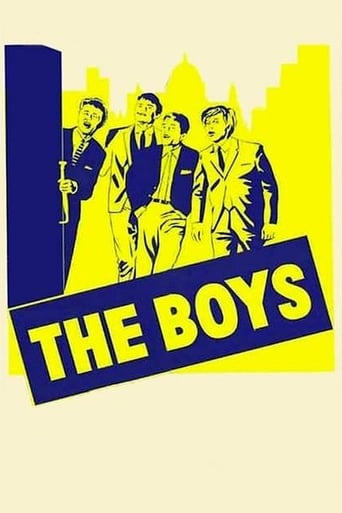didi-5
I almost avoided this because of its low ratings in some film guides, but decided at the last minute to watch. This film works very well because it presents events from two perspectives - first, from everyone who encounters the four boys (accused of robbery and murder) during their night out, and then, from the viewpoint of the boys themselves as they give evidence. This means that most scenes are filmed and presented twice, which works well in the context of a courtroom drama.What works especially well though is that the film does not conclude in the way you might expect, which makes it strong and relevant even many years after capital penalties for murder, for example, have been removed. Good performances from leads and cameos both.
Martin Bradley
This social-conscience movie, made in Britain in the early sixties, makes an earnest plea for the abolition of the death penalty and though it's couched in the form of a courtroom drama, (the whole film is the trial with flashbacks leading up to the events in question in the form of the evidence given by the witnesses and the defendants), it lacks the urgency and excitement that you expect from either a good thriller or even a half-decent social conscience movie. Instead it plods along from one scene to the next as first the witnesses give their evidence then the defendants contradict it.The boys are Dudley Sutton, Jess Conrad, (a British pop star of the time cast obviously to draw the youth market), Ronald Lacey and Tony Garnett, (yes, that Tony Garnett before going on to fame as producer of real social-realist films made mainly for television), and they stand accused of killing a night-watchman as they tried to rob a garage. The film bounces back and forth between the courtroom and the night in question; (the courtroom scenes are dull and talkative and aim for an air of 'authenticity'). The prosecuting counsel is Richard Todd who can't seem to muster any enthusiasm while Robert Morley stands for the defence. Morley is the best thing about the film; he's lively and he gives the film something of a buzz. (He also gets to do the 'serious' speech at the end). Ultimately it's the kind of movie that at half its length and done on TV might just have made an impact but on a widescreen and at two hours plus just seems to drag on forever. Give me Judge Judy any day.
normanmiller61
I came across this film channel-hopping late one night and got instantly hooked, partly by wondering how the writer might twist the courtroom action but mainly for the fabulous B/W images of working class London in the era between the dreary 50s and the swinging 60s.Well worth watching, too, for a sterling cast of British troupers, as well as a genuinely unexpected ending.And good, too, to see some political awareness slipped into the action with its portrayal of working-class Londoners, as well as an acknowledgement of boredom - not many many films are brave enough to show their characters genuinely trying to deal with boredom!
lucy-66
Four working class boys are accused of stabbing a night watchman at a garage for the money in the cashbox. It starts slowly as a courtroom drama, with lawyers and witnesses apparently attempting feeble comic turns. Where's the director? you wonder. Surely lawyers don't behave like this. The only good bits in this preamble are the flashbacks to the witnesses' encounters with the boys.Then Robert Morley as the boys' defence lawyer visits them in the cells and zap! the film comes alive. Perhaps because Morley's in control? He was a great actor, not to mention writer and director.The guys playing the boys are excellent too. They slouch in their chairs while Morley lays into them for not giving him anything to go on. He tells them how he was always taunted at school for being fat and gains their confidence.Then the boys go into the witness stand one by one and tell the story from their point of view. Yes - it's the Rashomon plot. We see their poor homes and parents, some antagonistic, some sympathetic. They tell the story of their attempt to have fun 'up west' in London's entertainment district, foiled by their lack of cash. See it if you want to know if they're guilty!There are some great British character actors including the lovely Betty Marsden, but the prosecuting lawyer is miscast - he looks about as dangerous as a kitten. Roy Kinnear is an embarrassment, but he's given the impossible task of trying to convey a witness with concealed and unspecified 'mental trouble' - something the British public were even more ignorant about back then.Dudley Sutton stands out as the gang leader. I believe he became an alcoholic and recovered and since the late 70s has popped up on television playing charming old buffers. xxxxxxx


